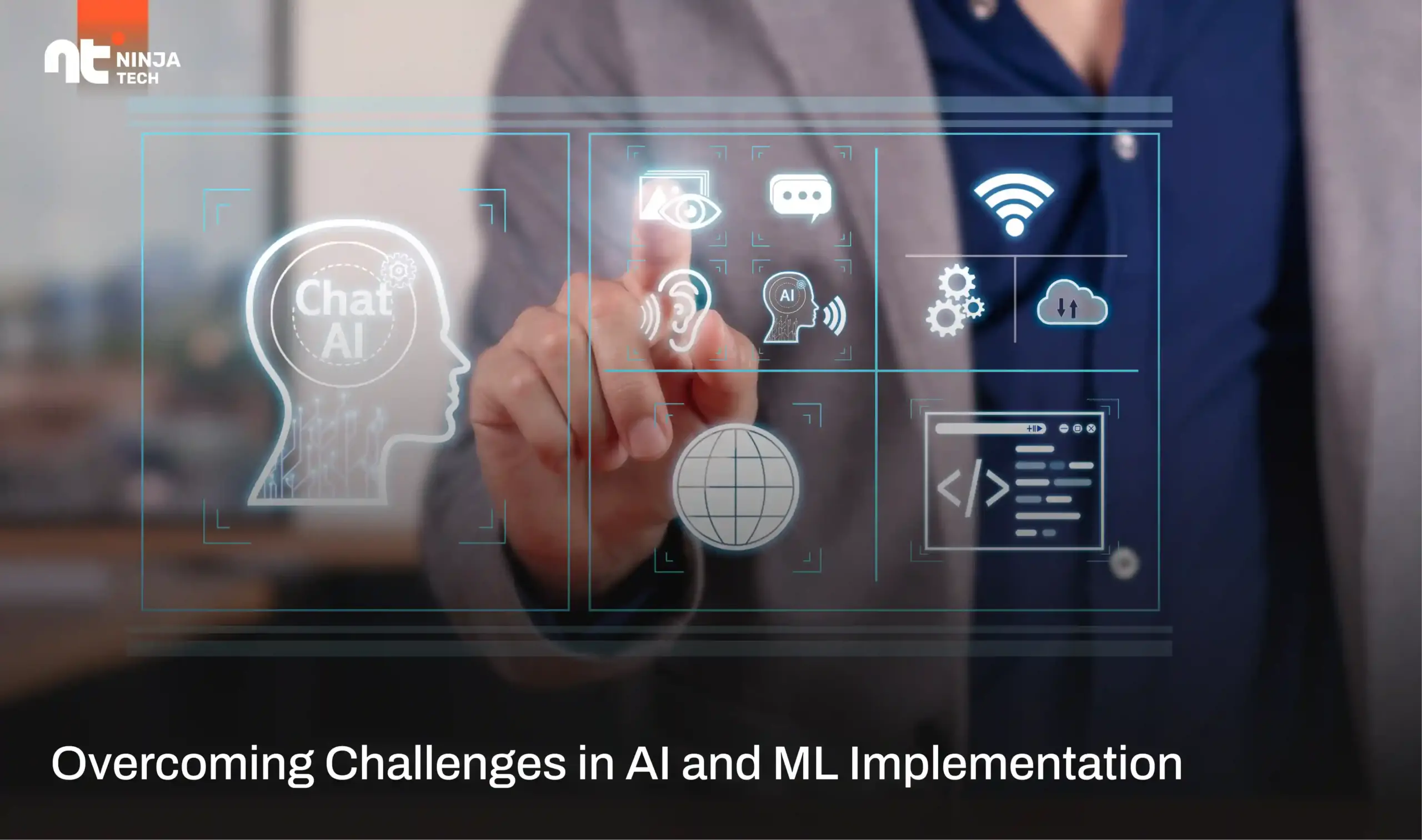Overcoming Challenges in AI and ML Implementation

Artificial Intelligence (AI) and Machine Learning (ML) are undeniably powerful technologies with the potential to revolutionize businesses and industries. However, implementing AI and ML solutions comes with its own set of challenges that organizations must navigate to succeed. Let’s delve into some common challenges and strategies for overcoming them in AI and ML implementation:
1. Data Quality and Availability
One of the fundamental requirements for successful AI and ML projects is high-quality data. However, organizations often face challenges related to the quality, cleanliness, and availability of data. Incomplete or biased data can lead to inaccurate predictions and unreliable models.
Strategy: Conduct a thorough data audit and cleansing process to ensure data quality. Implement data governance practices and establish clear protocols for data collection, storage, and preprocessing. Consider data augmentation techniques and leverage domain knowledge to fill gaps in the data.
2. Lack of Skilled Talent

AI and ML projects require specialized skills in data science, machine learning algorithms, and programming languages. The demand for AI talent often outstrips supply, making it challenging for organizations to recruit and retain skilled professionals.
Strategy: Invest in upskilling existing employees through training programs and workshops. Collaborate with universities or partner with external consultants who specialize in AI and ML. Consider outsourcing certain aspects of the project to reputable AI development firms with proven expertise.
3. Complexity of AI Models
Developing and deploying complex AI models can be daunting, especially for organizations new to AI and ML. Choosing the right algorithms, optimizing hyperparameters, and ensuring model scalability are common challenges.
Strategy: Start with simpler models and gradually progress to more complex ones as your team gains experience. Leverage AutoML tools that automate model selection and tuning processes. Collaborate with experts who can provide guidance on selecting the most suitable algorithms for your specific use case.
4. Interpreting and Explaining AI Decisions
Explainable AI (XAI) is crucial for gaining trust and acceptance from stakeholders who may not be familiar with AI technology. Complex AI models can produce accurate predictions, but understanding how decisions are made can be challenging.
Strategy: Use interpretable models whenever possible, such as decision trees or linear regression. Implement techniques for model interpretation, such as feature importance analysis or SHAP (SHapley Additive exPlanations) values. Communicate AI outputs in a transparent and understandable manner to stakeholders.
5. Cost and ROI Concerns

Implementing AI and ML solutions can involve significant upfront costs, including infrastructure, software, and talent acquisition. Demonstrating return on investment (ROI) and convincing stakeholders of the long-term benefits can be challenging.
Strategy: Conduct a thorough cost-benefit analysis before embarking on AI projects. Start with pilot projects to demonstrate feasibility and ROI. Measure and track key performance indicators (KPIs) to quantify the impact of AI implementations on business outcomes such as revenue growth, cost savings, or customer satisfaction.
6. Ethical and Regulatory Compliance
AI applications raise ethical considerations around privacy, bias, and fairness. Adhering to regulatory frameworks such as GDPR or CCPA adds complexity to AI implementations, particularly in sectors like healthcare and finance.
Strategy: Implement robust ethical guidelines and policies for AI development and deployment. Conduct bias audits to identify and mitigate biases in AI models. Collaborate with legal experts to ensure compliance with relevant regulations and standards.
7. Integration with Existing Systems

Integrating AI solutions with legacy systems and infrastructure can be challenging, especially in large enterprises with complex IT ecosystems. Ensuring compatibility, scalability, and minimal disruption during integration is crucial.
Strategy: Develop a comprehensive integration strategy early in the planning phase. Prioritize interoperability and scalability when selecting AI technologies and platforms. Consider phased implementation and conduct thorough testing to identify and resolve compatibility issues.
8. Change Management and Cultural Adoption
Introducing AI and ML into an organization requires cultural adaptation and change management. Resistance to change, lack of buy-in from stakeholders, and insufficient training can hinder adoption and implementation success.Strategy: Foster a culture of innovation and continuous learning within the organization. Communicate the benefits of AI and ML to all stakeholders and involve them in the implementation process. Provide training and support to employees to build confidence and proficiency in using AI tools and solutions.
Conclusion:
Implementing AI and ML solutions is a journey that requires careful planning, collaboration, and perseverance. By addressing these common challenges with proactive strategies and a clear roadmap, organizations can unlock the full potential of AI to drive innovation, improve decision-making, and achieve sustainable growth.


